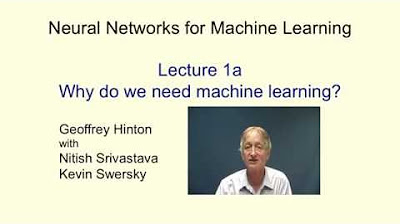Andrej Karpathy: Best IDE for programming | Lex Fridman Podcast Clips
Summary
TLDR这段视频脚本讨论了理想的计算机设置和编程环境,强调了使用大型显示屏和远程Linux集群进行深度学习任务的重要性。提到了VS Code作为当前最受欢迎的集成开发环境(IDE),并讨论了GitHub Copilot的集成,以及它如何帮助提高编程效率和发现新的API。同时,也表达了对未来编程自动化和程序合成发展的担忧,特别是在错误监控和验证方面。
Takeaways
- 🖥️ 个人计算机设置偏好因人而异,有人喜欢多屏幕,有人喜欢单一大屏幕。
- 💻 笔记本电脑和大屏幕是受访者熟悉的高效工作组合。
- 🖥️🐧 操作系统选择上,受访者平时主要使用macOS,但在进行深度学习任务时会使用Linux。
- 🔍 开发工作通常通过SSH远程连接到集群,而实际文件操作在远程位置进行。
- 📝 编辑器选择上,Visual Studio Code(VS Code)是受访者目前最喜欢的编辑器,因为它有大量的扩展和GitHub Copilot集成。
- 🤖 GitHub Copilot受到Python创始人Guido van Rossum的喜爱,它对编程有很大帮助。
- 🧠 与GitHub Copilot的交互需要学习如何判断其建议的有用性,以便更有效地利用它。
- 🔄 GitHub Copilot在代码补全和API建议方面特别有用,尤其是在模式识别和发现不熟悉的API时。
- 🔍 对于Copilot生成的代码,建议通过搜索引擎进一步验证其功能和用法。
- 🚀 程序合成的未来可能会发展为更加自动化,减少人为干预,可能会出现更多针对bug检测的自动化工具。
- 🌐 随着自动化编程工具的发展,程序员的数量和角色可能会发生变化,但目前看来,人类程序员仍不可替代。
- 🔄 语言模型的发展仍处于初级阶段,未来可能会有更多创新的工作方式出现,如与程序进行对话式编程。
Q & A
你认为理想的计算机设置是什么样的?
-理想的计算机设置因人而异,但根据这段话,一个常见的设置包括一个大屏幕,例如27英寸的显示器,以及一台笔记本电脑。这样的设置可以提高工作效率,尤其是在进行深度学习等复杂任务时。
为什么在深度学习任务中通常使用Linux操作系统?
-在深度学习任务中,Linux操作系统因其稳定性和对各种硬件和软件的广泛支持而受到青睐。此外,Linux提供了丰富的开源工具和库,这对于深度学习开发非常有用。
VS Code是如何与远程文件夹通过SSH进行连接的?
-VS Code可以通过SSH远程连接到服务器上的文件夹,这样开发者就可以在本地编辑器中直接操作远程文件。这需要在VS Code中配置SSH连接,然后挂载远程文件夹到本地项目中。
你认为VS Code是目前最好的IDE吗?为什么?
-是的,根据这段话,VS Code被认为是目前最好的IDE之一,因为它拥有大量的扩展插件,并且与GitHub Copilot集成,这为开发者提供了极大的便利。
GitHub Copilot对于编程有哪些帮助?
-GitHub Copilot可以帮助开发者自动完成代码,提供API建议,甚至帮助发现不熟悉的函数或库。它可以提高编程效率,尤其是在复制粘贴和模式匹配方面。
如何正确使用GitHub Copilot以提高编程效率?
-正确使用GitHub Copilot需要开发者学会判断何时应该接受其建议,何时应该忽略。例如,在模式清晰的情况下,Copilot在完成代码模式方面非常擅长;而在发现新API时,它可以提供学习的机会。但开发者应该对Copilot生成的代码进行验证,以确保其正确性。
你认为编程的未来会是怎样的?
-编程的未来可能会更加自动化,AI将在编程中扮演更重要的角色。例如,程序合成技术将使得编写更复杂的程序成为可能。同时,可能会出现新的工具来帮助发现和修复bug,以及进行代码审查。
自动化编程会对程序员的数量产生什么影响?
-尽管自动化编程可能会改变程序员的工作方式,但并不意味着会大幅度减少程序员的数量。相反,程序员的角色可能会发生变化,他们需要更多地与AI合作,提供指导和监督,确保生成的代码符合要求。
你认为未来的开发环境会有哪些变化?
-未来的开发环境可能会更加智能化和交互式。开发者可能需要与AI进行更多对话式交互,不仅仅是编写代码,还包括与AI讨论和调整程序逻辑。同时,开发环境的用户体验和交互设计将变得更加重要。
在自动化编程的趋势下,如何保证代码的质量和安全性?
-保证代码质量和安全性需要开发者和AI工具的共同努力。开发者需要对AI生成的代码进行仔细审查,同时,可能会出现新的自动化工具来帮助检测和修复bug。此外,建立严格的测试和验证机制也是确保代码质量的关键。
Outlines

This section is available to paid users only. Please upgrade to access this part.
Upgrade NowMindmap

This section is available to paid users only. Please upgrade to access this part.
Upgrade NowKeywords

This section is available to paid users only. Please upgrade to access this part.
Upgrade NowHighlights

This section is available to paid users only. Please upgrade to access this part.
Upgrade NowTranscripts

This section is available to paid users only. Please upgrade to access this part.
Upgrade NowBrowse More Related Video
5.0 / 5 (0 votes)






